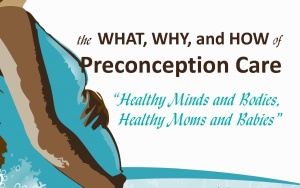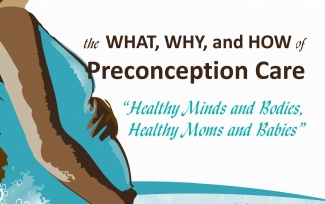Preconceptual Care
PRECONCEPTUAL CARE:[edit | edit source]
Preconception care is an opportunity for you and your partner to improve your health before you start trying for a baby. A healthcare professional can help you to assess your health, fitness and lifestyle, to identify areas that you may want to improve.[1]
Unplanned pregnancies are at greater risk of preterm birth and low birth weight babies. Another reason is that, despite important advances in medicine and prenatal care, about 1 in 8 babies is born too early. Researchers are trying to find out why and how to prevent preterm birth. But experts agree that women need to be healthier before becoming pregnant.
Assesment:[edit | edit source]
Each woman requires individual assessment.
Establish the following in order to offer appropriate advice:[2]
Timing of planned pregnancy.
Folic acid.
Smear history.
Smoking history.
Alcohol intake.
Weight (overweight or obese?).
Medication, including over-the-counter or herbal medication. History of illicit drugs?
Risks of exposure to hazardous substances or radiation.
Rubella immune status.
History of chickenpox or shingles.
Risk of hepatitis B.
History of miscarriage.
Risk or concern regarding chromosomal abnormalities or inherited genetic disorders.
Chronic health problems.
Timing of pregnancy:[edit | edit source]
Women and men should prepare for pregnancy before becoming sexually active — or at least three months before getting pregnant.
In couples having regular sexual intercourse every 2 or 3 days, and not using contraception, 84% will become pregnant within a year, and 92% within two years
• Following use of the contraceptive injection, normal fertility may take up to a year to re-establish.
• The optimum biological age for pregnancy is between 20-35 years of age.[3]
Medications:[edit | edit source]
f you are pregnant or thinking about becoming pregnant, talk with your doctor about any medications you are taking or thinking about taking. This includes prescription and over-the-counter medications, as well as dietary or herbal products. Less than 10% of medications approved by the U.S. Food and Drug Administration (FDA) since 1980 have enough information to determine their risk for birth defects.1
taking certain medications during pregnancy can cause serious birth defects. Examples are thalidomide (also known as Thalamid®) and isotretinoin (also known as Accutane®).
The effects depend on many factors, such as[4]
• How much medication is taken (sometimes called the dose).
• When during the pregnancy the medication is taken.
• Other health conditions a woman might have.
• Other medications a woman takes
Diet:[edit | edit source]
- Supplementation with folic acid is one of the most significant preventative interventions available in the preconceptual/antenatal period:
All women should take at least 400 micrograms/day whilst trying to become pregnant and for at least the first three months of pregnancy to reduce the risk of neural tube defects (NTDs).Women at high risk of NTD should take a higher dose of 5 mg/day until 12 weeks of pregnancy.[5]
- Reduce refined sugars and white flour (in the form of your usual suspects — cookies, doughnuts, Danish, cake, candy, and almost anything else you might grab from the vending machine, the coffee cart, the convenience store racks, the pastry shop.
- Relish the right stuff. Increase all the good things that your body (and your baby-to-be's body) needs: green leafies (those delicious salads), yummy yellows (apricots, carrots, papaya, mango), hearty whole grains (whole-wheat bread, brown rice, oatmeal), and low-fat dairy
- Stop being a meal skipper.
- Drink plenty of water
- Avoid contact with chemicals - You can use alternative green cleaning products, do not treat the house for pests, avoid passive smoking and use safety precautions at work if in contact with hazards eg. chemicals, lead etc.
- Avoid over heating - particularly saunas and spas. If exercising make sure you wear cool, comfortable clothing and drink plenty of water.
- If you do not exercise, try to start a reasonable and regular exercise routine - this has great benefits for pregnancy as well as your general health
- Avoid stress and practice relaxation
summary:[edit | edit source]
Women and men should prepare for pregnancy before becoming sexually active — or at least three months before getting pregnant. Some actions, such as quitting smoking, reaching a healthy weight, or adjusting medicines you are using, should start even earlier. The five most important things you can do for preconception health are:
1. Take 400 to 800 micrograms (400 to 800 mcg or 0.4 to 0.8 mg) of folic acid every day if you are planning or capable of pregnancy to lower your risk of some birth defects of the brain and spine, including spina bifida. All women need folic acid every day. Talk to your doctor about your folic acid needs. Some doctors prescribe prenatal vitamins that contain higher amounts of folic acid.
2. Stop smoking and drinking alcohol.
3. If you have a medical condition, be sure it is under control. Some conditions that can affect pregnancy or be affected by it include asthma, diabetes, oral health, obesity, or epilepsy.
4. Talk to your doctor about any over-the-counter and prescription medicines you are using. These include dietary or herbal supplements. Be sure your vaccinations are up to date.
5. Avoid contact with toxic substances or materials that could cause infection at work and at home. Stay away from chemicals and cat or rodent feces
Reference:[edit | edit source]
- ↑ http://www.nhs.uk/chq/Pages/2594.aspx?CategoryID=54&SubCategoryID=127<ref/> fckLRfckLRUnplanned pregnancies are at greater risk of preterm birth and low birth weight babies. fckLRAlthough many babies are still conceived accidentally, more and more hopeful parents-to-be and their medical advisers are becoming aware of the benefits of dealing with health problems and attaining optimal physical and mental well-being prior to pregnancy. Both partners may decide to prepare for conception by giving thought to their diet, alcohol consumption, smoking habits, exercise routines, occupation and drug (medicinal or social) intake.<br> fckLRfckLR                                                                                                                   
                                     fckLRfckLR==fckLR Assessment<br> ==fckLRfckLREach woman requires individual assessment.Talk to your doctor before you become pregnant. fckLRfckLREstablish the following in order to offer appropriate advice<ref>Pre-conception - advice and management; NICE CKS, June 2012<reference/> fckLRfckLRTiming of planned pregnancy.<br>Folic acid. fckLRfckLR Managing health problems, such as diabetes, high blood pressure, thyroid disease, Obesity, depression, eating disorders,hepatitus b and asthma.<br>Smear history.<br>Smoking history.<br>Alcohol intake.<br>Weight (overweight or obese?).<br>Medication, including over-the-counter or herbal medication. History of illicit drugs?<br>Risks of exposure to hazardous substances or radiation.<br>Rubella immune status.<br>History of miscarriage<br>Risk or concern regarding chromosomal abnormalities or inherited genetic disorders. fckLRfckLR== Timing of pregnancy:<br> ==fckLRfckLR<span>              Women and men should prepare for pregnancy before becoming sexually active or at least three months before getting pregnant</span><br>In couples having regular sexual intercourse every 2 or 3 days, and not using contraception, 84% will become pregnant within a year, and 92% within two years. Following use of the contraceptive injection, normal fertility may take up to a year to re-establish. The optimum biological age for pregnancy is between 20-35 years.<br> fckLRfckLR== <br>Medications:<br> ==fckLRfckLR                      f you are pregnant or thinking about becoming pregnant, talk with your doctor about any medications you are taking or thinking about taking. This includes prescription and over-the-counter medications, as well as dietary or herbal products. Less than 10% of medications approved by the U.S. Food and Drug Administration (FDA) since 1980 have enough information to determine their risk for birth defects.Taking certain medications during pregnancy can cause serious birth defects. Examples are thalidomide (also known as Thalamid®) and isotretinoin (also known as Accutane®). fckLRfckLRThe effects depend on many factors, such as:<ref>http://www.cdc.gov/pregnancy/meds/
                                    fckLRfckLR==fckLR Assessment<br> ==fckLRfckLREach woman requires individual assessment.Talk to your doctor before you become pregnant. fckLRfckLREstablish the following in order to offer appropriate advice<ref>Pre-conception - advice and management; NICE CKS, June 2012<reference/> fckLRfckLRTiming of planned pregnancy.<br>Folic acid. fckLRfckLR Managing health problems, such as diabetes, high blood pressure, thyroid disease, Obesity, depression, eating disorders,hepatitus b and asthma.<br>Smear history.<br>Smoking history.<br>Alcohol intake.<br>Weight (overweight or obese?).<br>Medication, including over-the-counter or herbal medication. History of illicit drugs?<br>Risks of exposure to hazardous substances or radiation.<br>Rubella immune status.<br>History of miscarriage<br>Risk or concern regarding chromosomal abnormalities or inherited genetic disorders. fckLRfckLR== Timing of pregnancy:<br> ==fckLRfckLR<span>              Women and men should prepare for pregnancy before becoming sexually active or at least three months before getting pregnant</span><br>In couples having regular sexual intercourse every 2 or 3 days, and not using contraception, 84% will become pregnant within a year, and 92% within two years. Following use of the contraceptive injection, normal fertility may take up to a year to re-establish. The optimum biological age for pregnancy is between 20-35 years.<br> fckLRfckLR== <br>Medications:<br> ==fckLRfckLR                      f you are pregnant or thinking about becoming pregnant, talk with your doctor about any medications you are taking or thinking about taking. This includes prescription and over-the-counter medications, as well as dietary or herbal products. Less than 10% of medications approved by the U.S. Food and Drug Administration (FDA) since 1980 have enough information to determine their risk for birth defects.Taking certain medications during pregnancy can cause serious birth defects. Examples are thalidomide (also known as Thalamid®) and isotretinoin (also known as Accutane®). fckLRfckLRThe effects depend on many factors, such as:<ref>http://www.cdc.gov/pregnancy/meds/
- ↑ http://www.patient.co.uk/doctor/pre-pregnancy-counselling
- ↑ http://www.womenshealth.gov/pregnancy/before-you-get-pregnant/preconception-health.html
- ↑ http://www.cdc.gov/pregnancy/meds/
- ↑ http://www.patient.co.uk/doctor/pre-pregnancy-counselling







